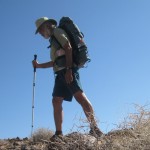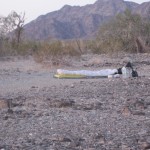What’s Up With That?
I must start by saying I usually hike alone. And by hiking alone, I mean going to places where I do not expect to see other people. That is a prime consideration for most of my trips. Now, I do not want to give the impression that by doing a lot of solo hiking I am especially brave or skilled. When you break it down, backpacking is just walking with your house on your back. Sure you need some skills, but it is not a big deal. Lots of people backpack. Mankind has been hiking since the dawn of time. It is nothing special – other than knowing when and how to avoid trouble.
I am not going to suggest that solo hiking is the best way to hike or try and convince anyone that they should try it. To be honest, I don’t even suggest to others that they should try hiking or backpacking. It is none of my business what others should or should not do with their lives; besides our wild places are already over used and over populated. It really gripes me when I see other folks trying to convince people to start backpacking, lighten their packs, make their packs heavier with all kinds of “just in case” gear, etc. We just need to mind our own business. If someone asks our opinion, then it is okay to give it though.
Nor am I going to extol the virtues of solo hiking. I you already do a lot of solo hiking, you know why you enjoy and do it. If you do not hike solo, but have decided to start, then you have your reasons also. If you are against this solo pursuit, that is okay too.
 I suppose the reason I decided to put my thoughts down regarding solo hiking is because there is so much discussion and controversy over the activity. Probably because as a society we no longer venerate the individual but elevate the collective. This has gotten so extreme that someone recently published and article putting forth that solo hiking might be a moral or ethical problem. That is, the solo hiker puts his own self interest above that of the collective, and this is what upsets most people who want to control the collective and ensure the common good – whatever on earth that is. There is no common good, because a group of people is divisible only down to the individual. They individual should decide what is best for them; the collective cannot determine what is good for everyone because you cannot create a blanket good for 100% of the collective. This thought process is a philosophical conundrum.
I suppose the reason I decided to put my thoughts down regarding solo hiking is because there is so much discussion and controversy over the activity. Probably because as a society we no longer venerate the individual but elevate the collective. This has gotten so extreme that someone recently published and article putting forth that solo hiking might be a moral or ethical problem. That is, the solo hiker puts his own self interest above that of the collective, and this is what upsets most people who want to control the collective and ensure the common good – whatever on earth that is. There is no common good, because a group of people is divisible only down to the individual. They individual should decide what is best for them; the collective cannot determine what is good for everyone because you cannot create a blanket good for 100% of the collective. This thought process is a philosophical conundrum.
 The biggest argument I see against solo hiking is that it is risky. Is it? Backpacking really isn’t all that risky — after all it is just walking. Of course one needs the skills, knowledge, and experience to be safe. Driving a car is more dangerous statistic-wise. But what I constantly hear and read is, What if this happens.., or what if that happens…, ad naseum. We can apply the same logic to everyday living, and come to the conclusion we should never leave our house.
The biggest argument I see against solo hiking is that it is risky. Is it? Backpacking really isn’t all that risky — after all it is just walking. Of course one needs the skills, knowledge, and experience to be safe. Driving a car is more dangerous statistic-wise. But what I constantly hear and read is, What if this happens.., or what if that happens…, ad naseum. We can apply the same logic to everyday living, and come to the conclusion we should never leave our house.
The problem I see with group hiking is what I call the lowest common denominator. As a group all aspects of a trip need to be decided by the group. Route, length of trip, pace, rest stops, night stops, food, etc. My experience with groups and collaboration is that the final product is diluted and divided to meet the lowest common denominator of the collective. No, two minds are not better than one in most cases. This applies to backpacking or most human endeavors.
Risk Aversion
Today, more than ever, the collective is too squeamish to take risks. By risk I mean engaging in any activity where the outcome is not guaranteed. People cannot deal with uncertainty. And this paranoia has now infiltrated all aspects of our lives, too the point where government is making our decisions for us. See my rant on the NYC Sugar Ban. People want a guaranteed job, guaranteed wages, guaranteed health care, and guaranteed retirement. They want “someone” to take care of them. We may become so risk averse that when we reach the end of our life, we will realize that we did not live a good life – we were too worried about “someone” taking care of us and guaranteeing a good life. We spent our lives worrying about the “What if’s” and missed the purpose of living.
When I started backpacking there were no cell phones, GPS devices, personal locator beacons, or other electronic shackles. We just went hiking. Even when I was a teenager, I told my parents about where I was going and about when I should be back. It was difficult to provide an exact time because I had to hitch-hike to the trail head, which in itself could take a day or more. And they weren’t concerned; they felt I knew what I was doing, even though I was a teenager. In this day and age, a parent would be arrested for child abuse if they let their kids to hiking alone on a multi-day trip.
Where would we be as a species if no one ever took a risk? And what is a risk? To most people it is exposure to danger. To me it is an uncertain outcome. Backpacking is not an uncertain outcome. Just like driving your car to work, you do not expect danger – although in rare cases accidents do happen. The same goes with backpacking.
What I do see today is that people are so connected via social networking and electronics they seem to have lost the ability to function without a network of others or even make a decision without input from their social network. Seems like people just don’t know what to do if they encounter a dilemma. They want to poll their network and come up with a collaborative solution, or a lowest common denominator solution. Seems to me that many solo hikers know what to do, they don’t need input from the collective.

